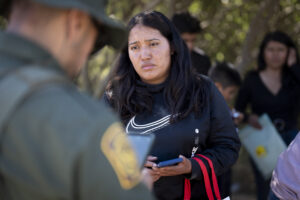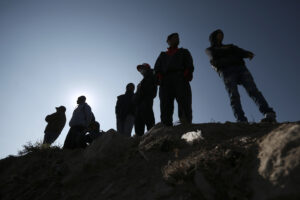U.S. Moves Migrant Kids After Facility’s Poor Conditions Exposed
All but 30 of more than 300 children are no longer at Clint, Texas, facility at which inadequate food, water and sanitation were reported.The U.S. government has removed most of the children from a remote Border Patrol station in Texas following reports that more than 300 children were detained there, caring for each other with inadequate food, water and sanitation.
Just 30 children remained at the facility near El Paso on Monday, said Rep. Veronica Escobar after her office was briefed on the situation by an official with Customs and Border Protection.
Attorneys who visited the Border Patrol station in Clint, Texas, last week said older children were trying to take care of infants and toddlers, The Associated Press first reported Thursday. They described a 4-year-old with matted hair who had gone without a shower for days, and hungry, inconsolable children struggling to soothe one another. Some had been locked for three weeks inside the facility, where 15 children were sick with the flu and another 10 were in medical quarantine.
“How is it possible that you both were unaware of the inhumane conditions for children, especially tender-age children at the Clint Station?” asked Escobar in a letter sent Friday to U.S. Customs and Border Protection acting commissioner John Sanders and U.S. Border Patrol chief Carla Provost.
She asked to be informed by the end of this week what steps they’re taking to end “these humanitarian abuses.”
Lawmakers from both parties decried the situation last week.
Border Patrol officials have not responded to AP’s questions about the conditions at the Clint facility, but in an emailed statement Monday they said: “Our short-term holding facilities were not designed to hold vulnerable populations and we urgently need additional humanitarian funding to manage this crisis.”
Although it’s unclear where all the children held at Clint have been moved, Escobar said some were sent to another facility on the north side of El Paso called Border Patrol Station 1. Escobar said it’s a temporary site with roll-out mattresses, showers, medical facilities and air conditioning.
But Clara Long, an attorney who interviewed children at Border Patrol Station 1 last week, said conditions were not necessarily better there.
“One boy I spoke with said his family didn’t get mattresses or blankets for the first two nights and he and his mom came down with a fever,” said Long, a senior researcher with Human Rights Watch. “He said there were no toothbrushes, and it was very, very cold.”
Vice President Mike Pence, asked about the unsafe, unsanitary conditions for the children on “Meet The Press” on Sunday, said “it’s totally unacceptable” adding that he hopes Congress will allocate more resources to border security.
Long and a group of lawyers inspected the facilities because they are involved in the Flores settlement, a Clinton-era legal agreement that governs detention conditions for migrant children and families. The lawyers negotiated access to the facility with officials and say Border Patrol knew the dates of their visit three weeks in advance.
Government rules call for children to be held by the Border Patrol in their short-term stations for no longer than 72 hours before they are transferred to the custody of Health and Human Services, which houses migrant youth in facilities around the country through its Office of Refugee Resettlement. Customs and Border Protection referred AP’s questions Sunday to the Office of Refugee Resettlement, which did not immediately respond.
Your support is crucial…With an uncertain future and a new administration casting doubt on press freedoms, the danger is clear: The truth is at risk.
Now is the time to give. Your tax-deductible support allows us to dig deeper, delivering fearless investigative reporting and analysis that exposes what’s really happening — without compromise.
Stand with our courageous journalists. Donate today to protect a free press, uphold democracy and unearth untold stories.









You need to be a supporter to comment.
There are currently no responses to this article.
Be the first to respond.